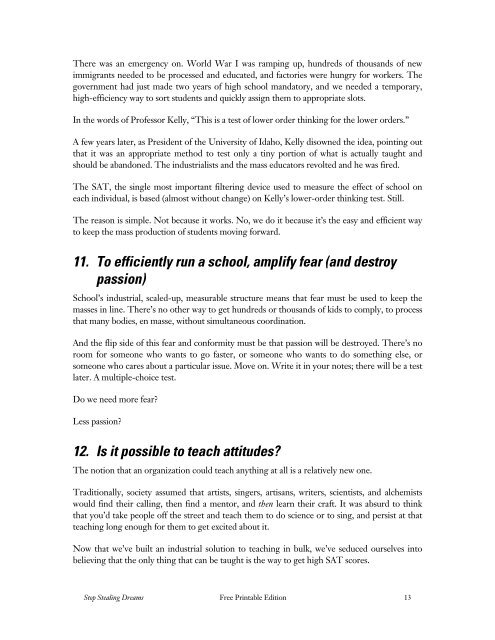1DO0vxU
1DO0vxU
1DO0vxU
Create successful ePaper yourself
Turn your PDF publications into a flip-book with our unique Google optimized e-Paper software.
There was an emergency on. World War I was ramping up, hundreds of thousands of new<br />
immigrants needed to be processed and educated, and factories were hungry for workers. The<br />
government had just made two years of high school mandatory, and we needed a temporary,<br />
high-efficiency way to sort students and quickly assign them to appropriate slots.<br />
In the words of Professor Kelly, “This is a test of lower order thinking for the lower orders.”<br />
A few years later, as President of the University of Idaho, Kelly disowned the idea, pointing out<br />
that it was an appropriate method to test only a tiny portion of what is actually taught and<br />
should be abandoned. The industrialists and the mass educators revolted and he was fired.<br />
The SAT, the single most important filtering device used to measure the effect of school on<br />
each individual, is based (almost without change) on Kelly’s lower-order thinking test. Still.<br />
The reason is simple. Not because it works. No, we do it because it’s the easy and efficient way<br />
to keep the mass production of students moving forward.<br />
11. To efficiently run a school, amplify fear (and destroy<br />
passion)<br />
School’s industrial, scaled-up, measurable structure means that fear must be used to keep the<br />
masses in line. There’s no other way to get hundreds or thousands of kids to comply, to process<br />
that many bodies, en masse, without simultaneous coordination.<br />
And the flip side of this fear and conformity must be that passion will be destroyed. There’s no<br />
room for someone who wants to go faster, or someone who wants to do something else, or<br />
someone who cares about a particular issue. Move on. Write it in your notes; there will be a test<br />
later. A multiple-choice test.<br />
Do we need more fear?<br />
Less passion?<br />
12. Is it possible to teach attitudes?<br />
The notion that an organization could teach anything at all is a relatively new one.<br />
Traditionally, society assumed that artists, singers, artisans, writers, scientists, and alchemists<br />
would find their calling, then find a mentor, and then learn their craft. It was absurd to think<br />
that you’d take people off the street and teach them to do science or to sing, and persist at that<br />
teaching long enough for them to get excited about it.<br />
Now that we’ve built an industrial solution to teaching in bulk, we’ve seduced ourselves into<br />
believing that the only thing that can be taught is the way to get high SAT scores.<br />
Stop Stealing Dreams Free Printable Edition 13


